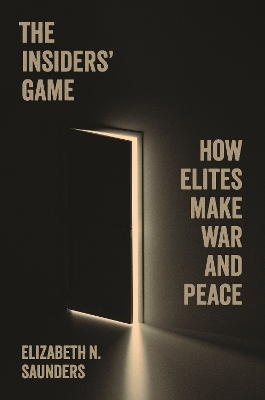
The Insiders’ Game
How Elites Make War and Peace
Seiten
2024
Princeton University Press (Verlag)
978-0-691-21580-8 (ISBN)
Princeton University Press (Verlag)
978-0-691-21580-8 (ISBN)
How elites shape the use of force in American foreign policy
One of the most widely held views of democratic leaders is that they are cautious about using military force because voters can hold them accountable, ultimately making democracies more peaceful. How, then, are leaders able to wage war in the face of popular opposition, or end conflicts when the public still supports them? The Insiders’ Game sheds light on this enduring puzzle, arguing that the primary constraints on decisions about war and peace come from elites, not the public.
Elizabeth Saunders focuses on three groups of elites—presidential advisers, legislators, and military officials—to show how the dynamics of this insiders’ game are key to understanding the use of force in American foreign policy. She explores how elite preferences differ from those of ordinary voters, and how leaders must bargain with elites to secure their support for war. Saunders provides insights into why leaders start and prolong conflicts the public does not want, but also demonstrates how elites can force leaders to change course and end wars.
Tracing presidential decisions about the use of force from the Cold War through the wars in Iraq and Afghanistan, Saunders reveals how the elite politics of war are a central feature of democracy. The Insiders’ Game shifts the focus of democratic accountability from the voting booth to the halls of power.
One of the most widely held views of democratic leaders is that they are cautious about using military force because voters can hold them accountable, ultimately making democracies more peaceful. How, then, are leaders able to wage war in the face of popular opposition, or end conflicts when the public still supports them? The Insiders’ Game sheds light on this enduring puzzle, arguing that the primary constraints on decisions about war and peace come from elites, not the public.
Elizabeth Saunders focuses on three groups of elites—presidential advisers, legislators, and military officials—to show how the dynamics of this insiders’ game are key to understanding the use of force in American foreign policy. She explores how elite preferences differ from those of ordinary voters, and how leaders must bargain with elites to secure their support for war. Saunders provides insights into why leaders start and prolong conflicts the public does not want, but also demonstrates how elites can force leaders to change course and end wars.
Tracing presidential decisions about the use of force from the Cold War through the wars in Iraq and Afghanistan, Saunders reveals how the elite politics of war are a central feature of democracy. The Insiders’ Game shifts the focus of democratic accountability from the voting booth to the halls of power.
Elizabeth N. Saunders is professor of political science at Columbia University. She is the author of Leaders at War: How Presidents Shape Military Interventions.
| Erscheinungsdatum | 28.02.2024 |
|---|---|
| Reihe/Serie | Princeton Studies in International History and Politics |
| Zusatzinfo | 14 b/w illus. 32 tables. |
| Verlagsort | New Jersey |
| Sprache | englisch |
| Maße | 156 x 235 mm |
| Themenwelt | Geschichte ► Teilgebiete der Geschichte ► Militärgeschichte |
| Sozialwissenschaften ► Politik / Verwaltung ► Europäische / Internationale Politik | |
| Sozialwissenschaften ► Politik / Verwaltung ► Politische Systeme | |
| Sozialwissenschaften ► Politik / Verwaltung ► Staat / Verwaltung | |
| ISBN-10 | 0-691-21580-4 / 0691215804 |
| ISBN-13 | 978-0-691-21580-8 / 9780691215808 |
| Zustand | Neuware |
| Haben Sie eine Frage zum Produkt? |
Mehr entdecken
aus dem Bereich
aus dem Bereich
neueste Manipulationstechniken als Waffengattung der NATO
Buch | Softcover (2023)
Westend (Verlag)
24,00 €
Deutschlands Schwäche in der Zeitenwende
Buch | Softcover (2023)
C.H.Beck (Verlag)
18,00 €


